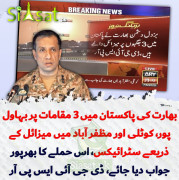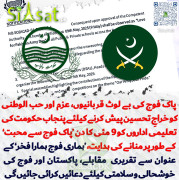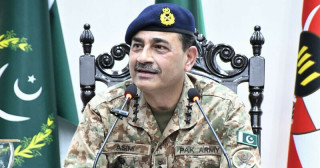A 'contagious' revolt - Could Egypt happen to Pakistan?
http://www.zoneasia-pk.com/ZoneAsia...evolt&format=pdf&option=com_content&Itemid=84
Could Egypt happen to Pakistan?
Since January 25, 2011, the world has been captivated by developments in Egypt. One after the other, like the domino effect, major cities in Egypt erupted in protests, calling for the removal of the Mubarak regime. Reminiscent of the color revolutions that took place in Eastern Europe during the twilight of President Bush's administration, the Egyptian situation has caused consternation for a lot of international actors, and analysts are on the edges of their seats trying to determine what this sociopolitical movement means for democracy in the middle east, and for political rights in the modern Muslim world at large.

There are a lot of causal factors that point to the current turmoil in Egypt. Most believe that it was Hosni Mubarak's elongated rule that will come to 30 years in power if he continues till October 2011. Almost all of this administration has been under emergency rule, which says a lot about the democratic process in Egypt and the freedoms Egyptian citizens enjoy - despite being allied to the United States. Even though Egypt has seen two revolutions - one in 1919 and another in 1952 which brought Gamal Abdel Nasser to power - the current regime is also descended from the 'revolutionary' legitimacy of the Nasser and Sadat eras. On January 21st,
Ahmad Aggour wrote that Egyptians should learn a lesson from the Tunisians and
send Mubarak packing, just like Zine el Abidine ben Ali.
It seems that the current revolution is designed to install a true democracy of the Egyptian people, thereby upturning the status quo established by the July 23 Revolution of 1952.
Larbi Sadiki has written an interesting opinion piece in Al Jazeera, where he labels the Egyptian and Tunisian revolutions as 'bread intifadas'. Arguing that the real terror facing Muslim societies is that of political, social and economic marginalisation, Sadiki claims that these bread riots come and go but regimes stay. Countries like Egypt, Algeria and Tunisia continue to be "the fodder of chaos in the absence of social justice, culturally sensitive sustainable development and democratic mediating networks and civic channels of socio-political bargaining and inclusion". "Oppositions and dissidents have not yet learned how to infiltrate governments and build strong political identities and power bases. This is one reason why the protests that produced 'Velvet revolutions' elsewhere seem to be absent in the Arab world."
Sadiki says that bread uprisings have positive and negative outcomes: "On the positive side, they act as elections, as plebiscites on performance, as an airing of public anger, they issue verdicts on failed policies and send stress messages to rulers".
There are also concerns about the future of Egypt after Mubarak - especially for the US and Israel, who counted Mubarak's Egypt as a firm ally. Mubarak and his newly appointed Vice President
Omar Suleiman was instrumental in the peace dealings between the Israelis and different factions of the Palestinians (Hamas and Fatah), and Suleiman was considered Israel's point-man in Egypt while he was chief of military intelligence. This has led to rumours that if Mubarak steps down, he is most likely to go into
exile in Tel Aviv.
All of this points to the opposition to Mubarak's pro-West regime from the Muslim Brotherhood - the Ikhwan-ul-Muslimeen - which seemed to be the main force behind the January 25th protests, except for the fact that a more progressive and pluralistic constituency is out on the streets, countering the Ikhwan's "Allahu Akbar" chants with "Muslim, Christian, We're all Egyptian". Resonating patriotism and renewed inter-religious harmony is evident after the recent
attacks on Egyptian Copts, and the protesters are keen to show that they are fighting for their country, and not specifically to install an Islamic government - an outcome the US is keen to avoid. The Muslim Brotherhood has also backed the consensus Opposition candidate,
Mohamad ElBaradei, to negotiate with the regime - this step has led to some erosion in ElBaradei's standing as a moderate, liberal, progressive alternative to Mubarak who will be more sensitive to popular demands.
Mubarak's reactions to the uprising have not been promising; he dismissed his 'government' and replaced his prime minister, but the most important development was the appointment of a Vice President. Anwar Sadat appointed Mubarak as his Vice President in February 1981, and Sadat was assassinated in October of that year. Conspiracy theorists are also saying that if Mubarak continues, Suleiman may contemplate "bumping Mubarak off" just like Mubarak "bumped off" Sadat. Egyptians only believe this if they convince themselves of an Israeli hand behind these transformations at the top echelons of Egyptian power.

Regional and international reactions are as confused as they could be. The US doesn't want to see Mubarak leave, but at the same time, it is urging Mubarak to give concessions, restore freedom of expression and the internet, and allow democracy and human rights to flourish. However, the CIA is busy establishing Suleiman as the go-to figure in Egypt, as the new Egyptian government has prominent faces from the same regime who are also well-connected to the Armed Forces - Mubarak and his new Prime Minister Ahmed Shafik both belonged to the Air Force. Especially after
Najib Mikati, a Hezbollah-backed billionaire, is poised to become Prime Minister of
Lebanon, it seems that Israel will not be willing to allow another one of its Muslim neighbours to shift towards the political right. Yet, it would not be impertinent to assume that the
Egyptian military holds the key to Mubarak's future and that of the country as well.
On Day seven of the protests, the protesters have called for a million-man march in Cairo, while Alexandria, Suez and other major Egyptian cities are waking up to this new revolution. Everyone, including the Egyptians on the streets, acknowledge that
the Army holds the keys to any future solution, and the Army itself realizes that an important transformation is taking place and it should not be left out of it. The Egyptian police retreated from the streets in the first few days of the Cairo protests, and the Army was called out to restore order. Egyptian policemen, especially from the feared and loathed secret services, continued to harass protesters, and some policemen in plainclothes were also caught shoplifting and were handed over to the authorities. The
Egyptian Army exercised utmost restraint in the use of force, and imposed curfews despite thousands of citizens violating the curfew at Tahrir Square. One placard at the protests urged the Army to "decide between Egypt and Mubarak", summing up the predicament the Egyptian Army itself would be facing at this point in time. The lower echelons are sympathetic to the people on the streets, and the rank-and-file of the Armed Forces are both professional and patriotic, but the top brass and generals' proximity to the current regime continues to draw the ire of the protesters, who may urge the soldiers to mutiny if the generals continue to support Mubarak.
The Pakistan government first stated via the Foreign Office that
Pakistani families in Cairo are safe, but on the fifth day of protests, the Foreign Office and Pakistan Air Force
extricated around 150 Pakistani families from Egypt. While this says a lot - or nothing at all - about the state of affairs and governance in Pakistan, many civil society activists, commentators and pundits are wondering whether a revolution along the lines of Tunisia and Egypt possible in Pakistan, or not. Some say that the Pakistani people should learn from the Egyptians and
make a decisive choice. Some Pakistanis even claim that because of Tunisia and Egypt,
a revolution in Pakistan is within reach. Yet, there are others who say that
the conditions and circumstances are not conducive for a revolution the likes of which has strangled Egyptian society.
The Pakistan government has
blocked Blackberry Enterprise services for foreign missions, embassies, high commissions, etc. in an apparent attempt to exercise regulatory control over the telecommunication infrastructure in Pakistan, and to keep a lid on undesirable news reaching the outside world. The PTA has
denied issuing such orders, but such a denial hasn't restored the diplomats' BES services. Regulatory checks and balances of such a nature were also utilized by the judiciary when it ordered a ban on Facebook, and authorized PTA to implement the ban - however ineffectively. While Pakistani netizens developed workarounds and continue to interact with social media websites, the ban only reminded people of how difficult it will continue to be for freedoms in Pakistan - especially for free speech and the freedom of expression. The International Federation of the Red Cross and Red Crescent (IFRC) have already stated that a
Tunisia-like unrest is possible in Pakistan because of the absence of food security. One might say that
an Egyptian revolution is possible in Pakistan if the government - sensing mass chaos - enforces a ban on the use of Facebook, Twitter, Google Talk, Skype, and other social media websites and connectivity systems. Such an attack on the internet use of Pakistani citizens - most of whom cannot spend a day without using the internet - will definitely bring these people out on the streets; out of sheer boredom if not incensed at the denial to use these harmless mediums of expression.
A greater revolt can be fomented if SMSes and mobile phone communications are also disrupted - while the PTA and existing PTCL infrastructure would most likely blame this on degradation of facilities, and would be partially telling the truth in doing so - it will bring out greater numbers of Pakistanis on the streets (including the religious fanatics, the extremists and teh fundamentalists) because Pakistan is a country where even in 2011,
11 people are joining the national cellular network, more than 430,000 SMS are sent and approximately 160,000 calls made in every single minute. Denying Pakistanis these services will definitely leave them with nothing to do - thus giving them either option or impetus to come out on the streets and protest against whatever they want to protest against, be it corruption, misgovernance, terrorism, extremism, Americanism, liberalism, and so forth. In any case, the religious parties will have more mass support and momentum, and as
the opportunistic activities of the PML-Q have shown, most liberal and secular parties will join and support the fray, not create their own momentum for other constituents to join in - despite liberal political leaders like
Altaf Hussain calling for revolution in every way possible. In this way, the liberals and seculars will be politically marginalised as their politicians will run to the religious right so as to garner greater voting banks with more guarantees and more stability. This will only strengthen the religious right - and their extremist extensions - in case of a Pakistani revolution.
Raza Rumi exclaims that the radicals rule the streets in Pakistan; "forget liberal - its not a good time to be a moderate".
 What would the Pakistani Army do
What would the Pakistani Army do if a 'revolution' does indeed transpire in such circumstances? It is well known that the 'jihad mentality' exists in the Armed Forces first and foremost - since it imbibed the defense of the nation with sacred struggle in the path of Allah - so many elements sympathetic to the religious right exist within the soldierly rank-and-file as well as in the general staff. Jihad has been the sole jurisdiction of the Armed Forces, to commit and undertake only when sanctioned by the state, until it was usurped by sectarian groups and militants with skewed ideologies and one-sided goals. The Pakistan Army recruitment centers depict "eeman, taqwa, jihad fi-sabilillah" mottos with a photograph of a brave soldier pointing towards the battlefield. The Army - seeing that fundamentalists are leading the revolution - will think twice about taking an overly liberal or Westernized approach, especially because of the way it has been pushed to the nether-regions (not borders) of Pakistani society, and is vilified and ridiculed like never before. If the liberal progressives cannot take the lead, or cannot support an organized military force that can counter radical extremists, the Army will be forced to bargain for a future with a definite role for religious fundamentalists in the corridors of power - even in Pakistan. Upon such a travesty taking place, the fundamentalists will have to decide whether they align themselves with the Taliban, or take a balanced approach and oppose the Taliban's antics in Pakistan - if they decide for the former, then Pakistan will go the way of Afghanistan, and if they decide the latter, then we can see some composite solution the likes of which Imran Khan has been harping on about for a few years now. Nevertheless, it is obvious that the Pakistan Army would not want to be in such a situation, and it is necessary for the political elite to realize that the Army should not be put in such a situation either, as it would exacerbate the existing social divide within Pakistan, and might also cause a mutinous disintegration within the Armed Forces as well.
In conclusion, one must refer to President Kennedy's timeless quote to sum up the current boiling situation in Egypt and the Muslim world at large: Those who make peaceful revolution impossible, make violent revolution inevitable.


































